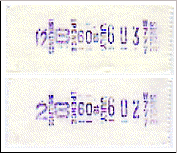|
|
|
 |
 |
|
|
 |
 |
 |
| As
well as single tickets and returns we sold
weekly tickets. These allowed regulars to
buy one ticket on a Monday or Tuesday for
one journey each way until Saturday. Initially
two of the journeys were free but later this
was reduced to one and then the discount was
abolished. Soon after I started, weekly and
return tickets were phased out. Before this,
conductors were instructed on certain days
to collect tickets when used for their final
journey so that usage could be assessed. Passengers
would argue that we were stealing the ticket
they had paid for, although it always remained
company property and was only really a token. |
 |
| Weekly
tickets were carried loose and overprinted
with the price, date and fare stage by inserting
them in the front of the ticket machine. If
the ticket was put in at an angle the extreme
left of the price missed the ticket but of
course the value still registered on the machine.
But if you didn't set the price up in the
first place ..... |
 |
| There
was a possible fiddle on tickets priced above
eleven shillings. If the price was set on
the machine and the ticket was printed at
an angle, the one was missing. Having spotted
this, one conductor started deliberately printing
the tickets at an angle. So if the fare was
twelve and eight he would only set two shillings
and eight pence on the dials. This gave him
a profit of ten shillings (half of a pound)
at a time when our weekly wage was about thirteen
pounds. He printed a lot of tickets and made
a great deal of of money. |
 |
 |
 |
| Naturally
this showed up in the takings
whenever he was on a bus on a
Monday morning but although I
could spot these tickets easily
and so could a conductress from
Andover who I talked to about
it, the inspectors could not. |
 |
| It was clear
from analysis of the takings where
he was making the money and a
lot of tickets were collected
and examined but the inspectors
simply did not know what thet
were looking for. He was eventually
caught issuing a three penny ticket
instead of a one shilling and
three penny and sacked! |
 |
| How to spot
it? The problem with this particular
fiddle was that there were only
two dials on the ticket machine,
one for the shillings and one
for the pence. This means that
the 12 had the same width as the
2 on its own. To put it the other
way, the two on the dud ticket
was too wide as can be seen on
the lower ticket. Obvious when
you know. |
|
|
 |
| During
the time the conductor was carrying out this
fiddle, I was asked if I would change shifts
with him on a Wednesday so that he could play
football. I agreed, not knowing that the exchange
had been set up by the inspectors. I went
out on the first bus to Eastleigh and Southampton
and was surprised to see an inspector waiting
for me on the way out of Eastleigh. My first
thought was that I had a passenger with one
of the dud tickets. Technically I was at fault
for accepting it and the inspector must have
been taken to this point to catch me. I need
not have worried. He didn't check any tickets
but got off in Swaythling saying he was going
to get some breakfast and would see me on
the way back. |
 |
| The
return journey was one of the hardest I had
ever known. Instead of simply clipping weekly
tickets and selling some singles and returns,
I had to collect every weekly and replace
it with the correct fare and stages printed
plus all the same journeys cancelled and the
current one. The inspector collected all the
other fares or let people off without paying.
On arriving back in Winchester, instead of
having a break, I had to calculate the cost
of all these tickets and claim a credit for
the total value. |
 |
| Despite
all this, nobody could see what was wrong
with the tickets. Much later, when the fiddle
was no longer possible, I finally showed the
inspectors how it was done. |
|
 |
|